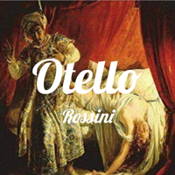
Overview
Synopsis
Otello returns to Venice, victorious from the war, and is granted citizenship of Venice by the Doge himself. No longer an outsider, he hopes that soon he will be able to reveal his secret marriage to Desdemona and be welcomed by her family, who have been vocal about their hatred of him. What he did not plan for, was that Desdemona’s father would arrange a marriage for her. As soon as he learns of the wedding ceremony, Otello has to interrupt the proceedings. He tells Desdemona’s father that she has already made an oath to him and the wedding cannot continue, but Desdemona’s reluctance to speak out and tell her father the truth plants a seed of doubt in Otello’s mind.
It takes little for Iago to suggest to Otello that Desdemona was having an affair with Rodrigo. He simply has to show Otello the letter Desdemona wrote, confessing her love, and Otello is certain of what happened. He has no idea that the letter was intended for him, and not for Rodrigo, but Desdemona had to lie to keep their secret.
Otello goes to Desdemona in her room, and desperately struggles with his desire to punish her for the pain he causes her, and his love of her which wants him to protect her. In a rage, he kills her, then closes the drapes surrounding her bed. Before he can take his own life, news arrives that he has been pardoned and he and Desdemona can be together. He pulls back the drapes to reveal Desdemona’s body, then he takes his own life.
Using the original story of The Venetian Moor from Giraldi Chintio’s 1565 novel for its source material, moreso than Shakespeare’s play, Rossini’s Otello marked an important point in operatic histories as one of the first truly tragic operas. Until this point, the first three centuries of Italian opera had focussed on happy endings, but from 1816 onwards Rossini laid the path for tragic operas, without which some of the greatest works in the genre may not have existed.
Show Information
Context
Plot
Characters
| Name | Part Size | Gender | Vocal Part |
|---|---|---|---|
|
Lead |
Male |
Tenor |
|
|
Lead |
Female |
Soprano |
|
|
Lead |
Male |
Tenor |
|
|
Supporting |
Male |
Tenor |
|
|
Supporting |
Female |
Soprano |
|
|
Supporting |
Male |
Bass |
|
|
Supporting |
Male |
Tenor |
|
|
Featured |
Male |
Tenor |
|
|
Featured |
Male |
Tenor |
|
|
Ensemble |
Either Gender |
Soprano, Mezzo-Soprano, Tenor, Baritone, Bass, Contralto |
Songs
Sinfonia
Act One
- No. 1 Introduction ‘Viva Otello, viva in prode’ - Chorus
- Recitative ‘Vincemo, o prodi’ - Rodrigo, Otello, Iago, Doge
- No. 2 Cavatina ‘Ah si, per voi già sento’ - Otello, Iago, Chorus
- Recitative ‘Rodrigo!... Elmiro!... Ah padre mio!’ - Rodrigo, Iago, Elmiro
- No. 3 Duet ‘No, none temer’ - Rodrigo, Iago
- No. 4 Scene ‘Inutile e quel pianto’ and Duet ‘Vorrei, che il tuo pensiero’ - Desdemona, Emilia
- Recitative ‘Ma che miro!’ - Desdemona, Emilia, Rodrigo, Iago, Elmiro
- No. 5 Finale ‘Santo Imen! Te guidi Amore’ - Desdemona, Emilia, Rodrigo, Otello, Elmiro, Chorus
Act Two
- Recitative ‘Lasciami, È dunque vano’ - Desdemona, Rodrigo
- No. 6 Aria ‘Che ascolto!’ ahime! Che dici!’ - Rodrigo
- Recitative ‘M’abbandonò! Disparve!’ - Desdemona, Emilia
- No. 7 Scene ‘Che feci! Ove mi trasse’ and Duet ‘Non m’inganno; al mio rivale’ - Otello, Iago
- Recitative ‘E a tanto giunger puote’ - Rodrigo, Otello
- No. 8 Trio ‘Ah vieni, nel tuo sangue’ - Desdemona, Rodrigo, Otello
- Recitative ‘Desdemona! Che veggo!’ - Desdemona, Emilia
- No. 9 Finale II ‘Che smania? Ahime! Che affanno?’ - Desdemona, Elmiro, Chorus
Act Three
- No. 10 Recitative ‘Ah! Dagli affanni oppressa’ - Desdemona, Emilia
- Song of the Gondoliero ‘Nessun maggior dolore’ - Gondoliero
- Recitative ‘Oh come infino al core’ - Desdemona, Emilia
- The Willow Song ‘Assisa a’ piè d’un salice’ - Desdemona
- Prayer ‘Deh calma, o ciel, nel sonno’ - Desdemona
- Scene ‘Eccomi giunto inosservato’ and Duet ‘Non arrestar il colpo’ - Desdemona, Otello
- Final Scene ‘Che sento!... Chi batte?’ - Lucio, Rodrigo, Doge, Otello, Elmiro, Chorus
A song with an asterisk (*) before the title indicates a dance number; a character listed in a song with an asterisk (*) by the character's name indicates that the character exclusively serves as a dancer in this song, which is sung by other characters.
Monologues
Scenes
Key Terms
Sorry! We do not currently have terms for this guide.
Videos
Quizzes
Themes, Symbols & Motifs
Sorry! We do not currently have learning modules for this guide.
Quote Analysis
Sorry! We do not currently have learning modules for this guide.
